Table of Contents
The Madhya Pradesh Employees Selection Board (MPESB) will conduct the MP TET Varg 3 Examination 2025 to recruit primary school teachers for government schools across the state. To prepare effectively, candidates should first understand the MP TET Varg 3 syllabus and exam pattern in detail. This includes knowing the subject-wise topics, marking scheme, and key preparation tips to create a focused study plan. Here’s a complete breakdown of the syllabus structure to help you organize your preparation efficiently.
MP TET Varg 3 Syllabus
The MP TET Varg 3 exam syllabus focuses on evaluating a candidate’s knowledge and teaching aptitude for primary-level education. Each section carries equal weight, helping ensure balanced assessment across core teaching competencies. The exam is conducted for Classes 1 to 5, and the syllabus includes five major sections:
- Language I (Hindi)
- Language II (English)
- Mathematics
- Science
- Social Science
Register Here For Free Study Material
MP TET Varg 3 Syllabus: Overview
The MP TET Varg 3 Primary Teacher Syllabus 2025 is tailored for candidates aspiring to join the School Education and Tribal Affairs Departments of Madhya Pradesh as teachers for Classes 1 to 5. Organized by the Madhya Pradesh Employees Selection Board (MPESB), this recruitment drive is expected to fill around 18,650 vacancies. The exam is tentatively set to commence on 31 August 2025, with the entire application process taking place online through the official website @esb.mp.gov.in.
| MP TET Varg 3 Primary Teacher Syllabus 2025 | |
| Exam Name | MP TET Varg 3 (Primary Teacher) 2025 |
| Conducting Body | Madhya Pradesh Employees Selection Board (MPESB) |
| Departments | School Education & Tribal Affairs Department |
| Vacancy | 18650 vacancies |
| Exam Date (Tentative) | From 31 August 2025 |
| Mode of Application | Online |
| Official Website | esb.mp.gov.in |
MP TET Varg 3 Exam Pattern 2025
Before you start preparing, it’s essential to understand the exam pattern. The MP TET Varg 3 paper includes 100 objective-type questions. Each correct answer is worth 1 mark, and there is no negative marking.
- Duration: 2 hours 30 minutes
- Question Type: Objective (Multiple Choice Questions)
- Mode of Exam: Offline
- Negative Marking: None
- Total Number of Questions: 100
MP TET Varg 3 Marking Scheme
The MP TET Varg 3 Marking Scheme 2025 is straightforward and candidate-friendly, focusing on objective-type questions with no negative marking. The paper carries a total of 100 questions for 100 marks, with each question carrying 1 mark. The subject-wise breakup includes Language I (Hindi) and Language II (English) with 15 questions each, Mathematics and Social Science with 20 questions each, and Science carrying the highest weightage with 30 questions. This clear distribution helps candidates allocate time and effort proportionally, ensuring balanced preparation across all subjects.
| MP TET Varg 3 Marking Scheme | ||
| Section | Questions | Marks |
| Language I (Hindi) | 15 | 15 |
| Language II (English) | 15 | 15 |
| Mathematics | 20 | 20 |
| Science | 30 | 30 |
| Social Science | 20 | 20 |
| Total | 100 | 100 |
Subject-Wise MP TET Varg 3 Syllabus 2025
The MP TET Varg 3 Primary Teacher Syllabus 2025 is divided into five key subjects, each designed to evaluate specific teaching skills and subject knowledge essential for primary education. In this section, you’ll find a detailed breakdown of the syllabus for every subject such as Language I (Hindi), Language II (English), Mathematics, Science and Social Science. Going through each subject individually will give you a clear understanding of the topics covered, helping you identify your strengths and focus areas. This structured insight sets the foundation for smart preparation, allowing you to map out a study plan, prioritize high-weightage topics, and approach the exam with clarity and confidence.
Hindi Language Syllabus for MPTET Varg 3
- Unseen Passages: Comprehension, grammar, and inference from prose (factual, descriptive, literary) and poetry.
- Grammar Fundamentals: Hindi alphabet, pronunciation, spelling, Noun (gender, number, case), Pronoun, Verb, Adjective, Adverb, Indeclinables.
- Vocabulary: Tadbhava, Deshaj, Foreign words, Synonyms, Antonyms, One-word substitution.
- Sentence Structure: Types, analysis, synthesis, transformation, error correction, idioms, proverbs.
- Word Formation: Sandhi, Samas, Prefixes, Suffixes.
English Language Syllabus for MPTET Varg 3
- Reading Comprehension: Unseen prose/poetry passages for comprehension, interpretation, inference, and vocabulary.
- Vocabulary & Word Formation: Synonyms, Antonyms, One-word substitution, Prefixes, Suffixes.
- Parts of Speech: Noun, Pronoun, Prepositions, Conjunctions, Verb, Adverbs, Adjectives, Determiners, Articles.
- Grammar & Sentence Structure: Tenses, Subject-verb agreement, Transformation of sentences (affirmative, negative, interrogative), Kinds of Sentences (Simple, Compound, Complex).
Mathematics Syllabus for MPTET Varg 3
- Number System: Whole, decimal, fractions, integers, rational, irrational, real numbers; properties, operations, factors, multiples, HCF, LCM, squares, cubes, exponents.
- Algebra: Algebraic expressions, factorization, polynomials (zeros, remainder theorem, identities), linear equations (one/two variables, graphical/algebraic methods), quadratic equations (factorization, completing the square, nature of roots).
- Geometry & Coordinate Geometry: Symmetry, lines, angles, triangles (types, congruence, similarity, inequalities), quadrilaterals, areas of parallelograms and triangles, circles (terms, angles, tangents, chords), Cartesian system, plotting points, distance, section formula, area of a triangle.
- Mensuration: Perimeter, area (Heron’s Formula, circles, combined figures), surface area (cuboid, cylinder, cone, sphere, combinations), volume (cuboid, cylinder, cone, sphere, combinations, frustum).
- Statistics & Probability: Data collection, handling, presentation (graphical), measures of central tendency (mean, median, mode), cumulative frequency.
- Probability (experimental, theoretical), random experiments, events.
- Trigonometry: Ratios, specific angles, complementary angles, identities, heights and distances.
Science Syllabus for MPTET Varg 3
Biology:
- Biological Classification: Plant and Animal Kingdoms.
- Human Systems: Digestive, respiratory, excretory, circulatory, reproductive, nervous systems; muscles, endocrine system.
- Cell & Tissues: Structure and functions of organelles, plant and animal tissues.
- Biomolecules: Carbohydrates, proteins, lipids, nucleic acids, enzymes, vitamins.
- Evolution & Genetics: Origin of life, biological evolution, variation.
- Health: Reproductive health, STDs, birth control, pathogens, immune science, vaccines, cancer, HIV/AIDS, adolescence issues, addiction.
- Ecology: Atmosphere components, ecosystem, pollution types, biodiversity.
- Plant Biology: Morphology, anatomy, photosynthesis, respiration, transportation, growth, reproduction.
- Agriculture & Environment: Crop production, conservation (plants, animals, forest, soil), waste management.
Chemistry:
- Atomic Structure: Charged particles, atomic models (Thomson, Rutherford, Bohr), electron distribution, valency, atomic number/mass, isotopes, isobars, quantum mechanical model.
- Hydrocarbons: Classification (alkanes, alkenes, alkynes), nomenclature, isomerism, properties, ethanol, ethanoic acid, aromatic hydrocarbons (benzene), carcinogenicity, toxicity, soaps, detergents.
Physics:
- Force, Mechanics & Heat: Unit systems, motion (distance, displacement, speed, velocity, acceleration, equations), laws of motion, momentum, impulse, friction, work, energy, power, gravitation, pressure in fluids, buoyancy, Archimedes’ principle, temperature, heat, specific heat, heat transfer (conduction, convection, radiation), states of matter, latent heat.
- Electricity, Magnetism, Light & Sound: Electric charge, Coulomb’s law, electric fields, current, conductors, insulators, Ohm’s law, resistance, bar magnet, magnetic fields, magnetic effect of current, Oersted’s Experiment, force on conductor, Fleming’s rules, electric motor, electromagnetic induction. Reflection, spherical mirrors, refraction, total internal reflection, optical fiber, lenses. Sound waves, echo, ultrasound, supersonic waves.
Register Here For Free Study Material
Social Science Syllabus for MPTET Varg 3
Geography:
- India: Size, location, physical features, drainage (Himalayan, Peninsular rivers), climate, natural vegetation.
- Earth & Universe: Solar system (Sun, planets, etc.), globe (latitude, longitude, time), Earth’s heat zones, rotation, revolution, seasons.
- Maps: Types (physical, political, thematic), components (scale, direction, symbols, sketch).
- Domains of Earth: Hydrosphere, lithosphere, atmosphere, biosphere, environment components.
- Earth’s Dynamics: Internal structure, endogenetic/exogenetic forces, landforms (erosional, depositional).
- Atmosphere: Composition, structure, weather, climate, air pressure, winds, rainfall, precipitation forms.
- Water Bodies: Water distribution, waves, tsunami, tides, ocean currents.
- Resources: Meaning, types, planning, land resources (use patterns, degradation, conservation), soils (classification, erosion, conservation).
- Agriculture: Types, main crops of India.
- Minerals: Metallic/non-metallic, distribution, conservation.
History:
- Fundamentals: Meaning of history, sources of ancient Indian history (archaeological, literary).
- Ancient India: Paleolithic, Chalcolithic, Harappan culture; Vedic Era, Buddhism, Jainism, Vaishnavism, Shaivism; Mahajanapadas, rise of Magadh.
- Dynasties: Haryanka-Shishunaga, Maurya, Kushan, Gupta, Vardhana, Chola, Chalukya, Pallava.
- Medieval India: Rise of Rajputs, Muslim invasions, Delhi Sultanate, Vijayanagara, Mughal Empire, Marathas.
- Religious-Social Movements: Bhakti-Sufi, Sikhism.
- Modern India: European arrival, British rule (policies, economy, administration), Indian Renaissance, freedom struggle (1857, tribal/peasant revolts), Indian National Congress, revolutionaries, Gandhian movements, prominent personalities.
- World History: French Revolution, German/Italian Unification, Socialism, Russian Revolution, WWI, League of Nations, WWII, UN, Nazism, Fascism, Industrialization.
Political Science:
- Political Theory: Meaning, definition, importance.
- State: Meaning, definition, importance, elements, origin theories.
- Basic Political Concepts: Liberty, Equality, Social Justice, Rights.
- Democracy: Diversity, harmony, conflict.
- Indian Constitution: Formation, preamble, sources, features, fundamental rights/duties, directive principles, amendments.
- Indian Democracy Functioning: Administrative system (federal, power division), government structure (Legislature, Executive, Judiciary), Local Self-Government (73rd/74th amendments), Human Rights Commissions.
Planning: Five-Year Plans, NITI Aayog.
- Challenges to Democracy: Population, unemployment, communalism, terrorism, drug abuse, hindrances, remedies.
- Elections: Election Commission, functions, process, reforms, challenges, women’s role.
- Political Parties & Groups: National, regional, pressure/interest groups.
- World Organizations: SAARC, ASEAN, SCO, G-20, G-8.
Economics:
- Fundamentals: Meaning, definition, importance, departments (consumption, production, exchange, distribution, public finance).
- Key Concepts: Utility (marginal, total, average), Production (marginal, total, average), Demand and Supply (law, elasticity), Cost, Revenue.
- Measures of Central Tendency: Mean, Median, Mode.
- Economy Types: Capitalistic, socialistic, mixed; central problems.
- Sectors of Economy: Primary, Secondary, Tertiary.
- Money & Banking: Barter system, money functions, central/commercial banks.
- National Income: Meaning, related concepts (GDP, GNP, NDP, NNP, Per Capita Income), measurement.
- International Trade: Balance of Trade/Payment (meaning, items, unfavorable BOP causes), import-export importance.
- LPG Policy: Liberalization, Privatization, Globalization (importance, effect).
MPTET Varg 3 Syllabus PDF Download Link
You can download the official MPTET Varg 3 Syllabus PDF directly from the following Link Provided by Adda247.
MPTET Varg 3 Syllabus PDF Download Link
MP TET Varg 3 Preparation Tips 2025
- Start early and divide your study time across all five subjects.
- Prioritize Child Development and Pedagogy as it forms the core of teaching aptitude.
- Solve previous year question papers to get familiar with the question style.
- Use NCERT books for conceptual clarity, especially in EVS and Mathematics.
- Regularly revise grammar rules and comprehension exercises for both languages.

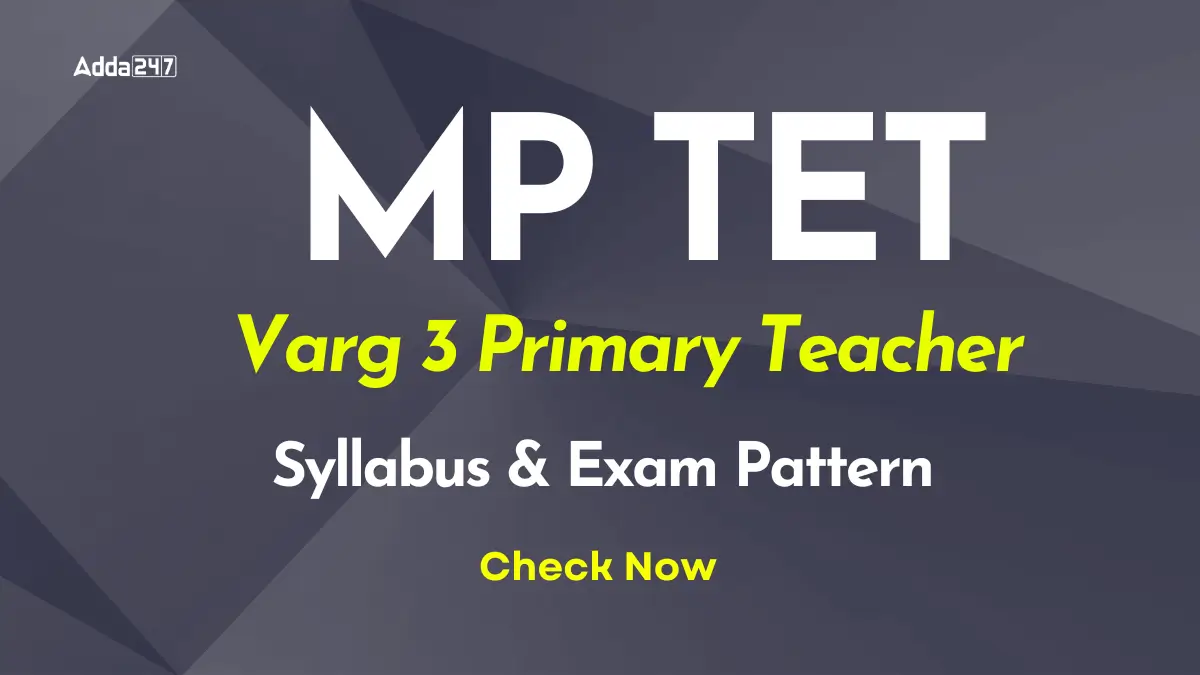
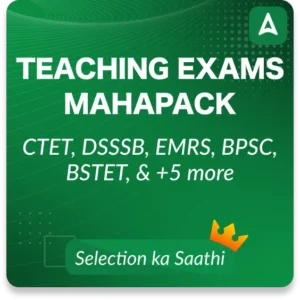

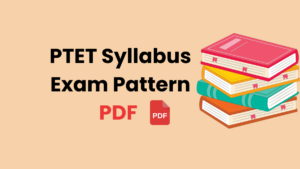 Rajasthan PTET 2026 Syllabus, Check Exam...
Rajasthan PTET 2026 Syllabus, Check Exam...
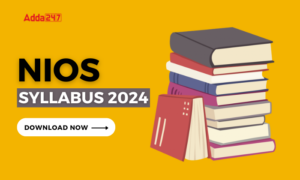 NIOS Syllabus 2026 and New Exam Pattern ...
NIOS Syllabus 2026 and New Exam Pattern ...
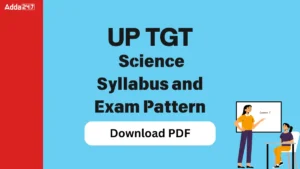 UP TGT Science Syllabus 2026 and Exam Pa...
UP TGT Science Syllabus 2026 and Exam Pa...













